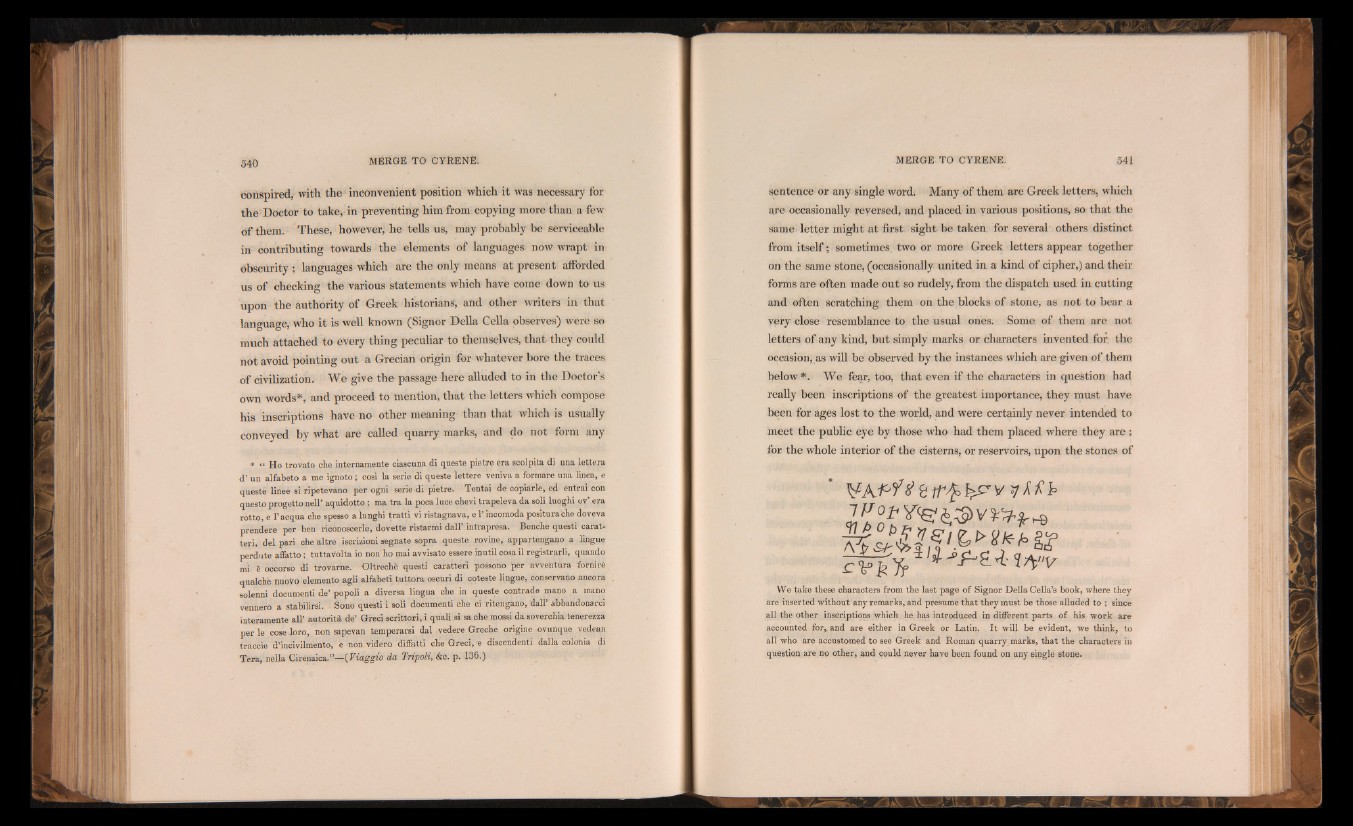
conspired, with the inconvenient position which it was necessary for
the Doctor to take, in preventing him from copying more than a few
of them. These, however, he tells us, may probably be serviceable
in contributing towards the elements of languages now wrapt in
obscurity ; languages which are the only means at present afforded
us of checking the various statements which have come down to us
upon the authority of Greek historians, and other writers in that
language, who it is well known (Signor Della Celia observes) were so
much attached to every thing peculiar to themselves, that they could
not avoid pointing out a Grecian origin for whatever bore the traces
of civilization. We give the passage here alluded to in the Doctor’s
own words*, and proceed to mention, that the letters which compose
his inscriptions have no other meaning than that which is usually
conveyed by what are called quarry marks, and do not form any
* “ Ho trovato che internamente ciascuna di queste pietre era scolpita di una lettera
d ’ un alfabeto a me ignoto ; cosi la serie di queste lettere veniva a formare una linea, e
queste linee si ripetevano per ogni serie rii pietre. Tentai de copiarle, ed entrai con
questo progetto nell’ aquidotto ; ma tra la poca luce chevi trapelerà da soli luoghi ov’ era
rotto, e l’acqua che spesso a lunghi tratti vi ristagnava, e l’incomoda positura che doveva
prendere per ben riconoscerle, dovette ristarmi dall’ intrapresa. Benché questi carat*
teri, deipari che altre iscrizioni segnate sopra queste rovine, appartengano a lingue
perdute affatto ; tuttavolta io non ho mai avvisato essere inutil cosa il registrarli, quando
mi. è occorso di trovarne. Oltreché questi caratteri possono per avventura fornirà
qualche nuovo elemento agli alfabeti tuttora oscuri di coteste lingue, conservano ancora
solenni documenti de’ popoli a diversa lingua che in queste contrade mano a mano
vennero a stabilirsi. Sono questi i solì documenti che ci ritengano, dall’ abbandonarci
interamente all’ autorità de’ Greci scrittori, i quali si sa che mossi da soverchia tenerezza
per le cose loro, non sapevan temperarsi dal vedere Greche origine ovunque vedean
treccie d’incivilménto, è-non videro diffatti che Greci, 'e discendenti dalla colemia di
Tera, nella Cirenaica.”—{Viaggio da Tripoli, &c. p. 136.)
sentence or any single word. Many of them are Greek letters, which
are occasionally reversed, and placed in various positions, so that the
same letter might at first sight be taken for several others distinct
from itself; sometimes, two or more Greek letters appear together
on the same stone, (occasionally united in a kind of cipher,) and their
forms are often made out so rudely, from the dispatch used in cutting
and often scratching them on the blocks of stone, as not to bear a
very close resemblance to the usual ones. Some of them are not
letters of any kind, but simply marks or characters invented for the
occasion, as will be observed by the instances which are given of them
below *. We fear, too, that even if the characters in question had
really been inscriptions of the greatest importance, they must have
been for ages lost to the world, and were certainly never intended to
meet the public eye by those who had them placed where they are ;
for the whole interior of the cisterns, or reservoirs, upon the stones of
A"V
We take these characters from the last page of Signor Della Celia’s book, where they
are inserted without any remarks, and presume that they must be those alluded to ; since
all the other inscriptions which he has introduced in different parts of his work are
accounted for, and are either in Greek or Latin. It will be evident,, we think, to
all who are accustomed to see Greek and Roman quarry marks, that the characters in
question are no other, and could never have been found on any single stone.